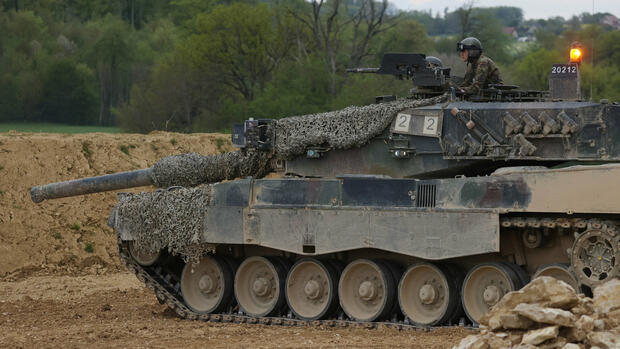In addition to the Leopard 2 tanks, a lot of ammunition was delivered to Ukraine, according to the Defense Ministry.
(Photo: Reuters)
Berlin The Union accuses the federal government that far too little is still happening in the procurement of ammunition for the Bundeswehr. The topic is “a good example of how announcements and reality diverge,” criticized the defense policy spokesman for the CDU/CSU parliamentary group, Florian Hahn, on Tuesday in Berlin.
After the “munitions summit” in the Chancellery at the end of November 2022, the federal government overslept another six months. The standstill is no longer acceptable, emphasized the CSU politician.
According to high-ranking military officials, the Bundeswehr is further away from the NATO requirement to have ammunition ready for 30 days of combat than ever before. The already scarce stocks were further emptied by levies to the Ukraine.
According to the Ministry of Defense, in addition to ammunition for the Leopard 2 and Marder tanks and the Mars multiple rocket launchers, 22 million rounds of small arms ammunition, 100,000 hand grenades, missiles for the Patriot air defense system and 23,500 rounds of artillery shells have been delivered.
But while France, for example, immediately reorders ammunition sent to the Ukraine from the industry, that doesn’t happen in Germany, criticized Hahn. The industry is doing everything it can to expand its capacities.
Rheinmetall, for example, has increased its production of 120-millimeter ammunition for the Leopard 2 main battle tank sixfold in a very short space of time. The output of artillery shells is to be increased from 450,000 to 700,000 a year with the takeover of the Spanish Expal Systems. Hahn criticized that while other countries were buying Leopard ammunition on a large scale, the Bundeswehr had still not ordered anything.
Ministry of Defense is silent
In its answer to a small question from the Union faction, the Ministry of Defense is largely silent about the actual state of the ammunition stocks and refers to the secrecy. The government does not even want to make the information available in the Bundestag secret service, where authorized parliamentarians could see it.
Read more about procurement of ammunition
Actually, the “munitions summit” on November 28th was supposed to speed up procurement. In addition to Rheinmetall, the companies Krauss-Maffei Wegmann (KMW), MBDA, Diehl Defence, Hensoldt, FFG and Dynamit Nobel Defense also took part in the meeting in the Chancellery.
But after the meeting, too little happened from the point of view of the Union. She also attributes this to the fact that there is no responsible organizational unit in the Ministry of Defense that takes care of ammunition procurement centrally. And the CDU budget politician Ingo Gädechens suspects that the traffic light coalition does not seem to know where to get the necessary money from.
Defense Minister Boris Pistorius (SPD) is faced with a “legacy” from his predecessor Christine Lambrecht, “which could have been cleared long ago,” said Gädechens. Because Lambrecht failed to reserve enough money for ammunition in the defense budget or the 100 billion euro special fund.
Contracts worth almost nine billion euros
In the adjustment meeting for the 2023 federal budget, the budget holders had increased the funds for ammunition by 125 million to 1.13 billion euros, but this was at the expense of the maintenance of the Eurofighter. Only with this increase can the Bundeswehr make full use of the framework contracts for ammunition concluded with industry.
Defense Minister Boris Pistorius (SPD) is faced with a “legacy” from his predecessor Christine Lambrecht.
(Photo: dpa)
For 2024 and 2025, the federal government has increased the commitment appropriations by one billion euros to 1.8 billion euros, but that is far from enough, criticized Gädechens: “We need much higher sums.” The government must raise the necessary money for ammunition without to slash other equipment projects.
The defense policy spokesman for the SPD parliamentary group, Wolfgang Hellmich, does not want to leave it at that: “Everyone is aware that ammunition production must be increased throughout Europe as a result of the Russian attack on Ukraine,” he told the Handelsblatt.
After 296 million euros in 2015, 800 million euros were spent on ammunition last year, and this year even 1.13 billion euros are available. And in the current year, contracts totaling EUR 8.9 billion have already been or will be concluded.
“The problems inherited from the Union of a lack of ammunition depots, a lack of personnel and a lack of production capacity in industry are being tackled at full speed by Defense Minister Pistorius,” said Hellmich.
>> Read here: Pistorius is threatened with additional spending in the billions by the Bundeswehr
What the industry needs above all is planning security – either through the federal government sharing the costs of expanding capacity or at least through binding purchase guarantees so that in the end it doesn’t get stuck with the increased production. In Hungary, for example, the state financed the construction of a new explosives factory by Rheinmetall and the Hungarian N7 holding company, said CDU defense politician Jens Lehmann.
Without state subsidies or firm purchase commitments, the Bundeswehr will not get enough ammunition, emphasizes Lehmann. The federal government should not rely solely on the market here. When it comes to heaters or other issues, she “takes hold of the spokes”.
More: The invisible hand of the state: How Germany’s “deep state” is slowing down the turning point
